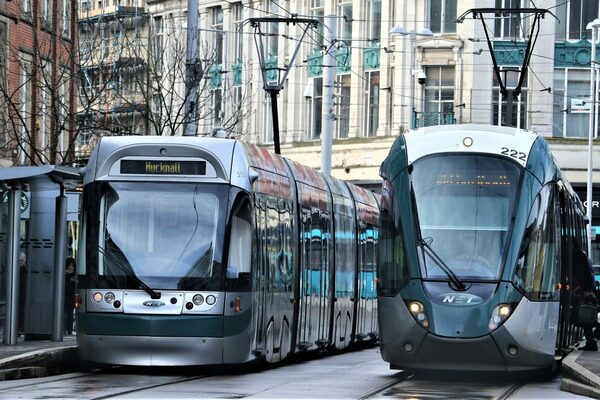Lessons from recent metro systems
A combination of economic and demographic trends along with the impact of Covid-19 are making it harder for cities to attract the investment needed for recovery. A common issue is not only what projects to promote but also how to attract funding for infrastructure projects that take years to pay off. To throw light on what can be done the Academy of Urbanism is organising a ‘virtual study tour’ to three award winning ‘great cities’ – Dublin, Copenhagen, Aarhus and Nottingham – The event is part of an initiative to set up a learning network to open up fresh sources of finance for intra-urban movement.
Four mid-sized European cities have all implemented transit-oriented development schemes in recent years, and their experience will be relevant to others such as Oxford, Bristol, Belfast, Edinburgh, Leeds, Stoke, Teesside and many more that face similar challenges in planning urban growth:
Dublin started with the Dublin Area Rapid Transit (DART) using existing railway lines to connect up suburbs along the coast. It has since opened the two lines of the LUAS in 2004 which is being extended further out of the city through the Strategic Transport Plan. Luas is the Irish word for speed, and the tram lines run over 42 kilometres (26 miles) with 67 stations providing a reliable and quality service that integrates different parts of the city. The scheme was funded by the Irish government and the European Investment Bank. The challenge is still reducing car use in the city’s suburbs.
Copenhagen opened its first line in 2002, which now has 39 stations on four lines. The first Metro line 20 km long was funded through Land Value Capture from the new town of Orestad built on former military land. The city and government established a Public Asset Corporation called Port and City to fund infrastructure by pooling public land, and then rezoning it as the basis for raising debt. It has gone on to develop former port land on a second line. A challenge is extending the system and transferring lessons to smaller cities such as Aarhus, which has just opened its first tram line.
Aarhus first proposed a light rail system in 2008, and subsequently opened in 2017. It is under continuous development, with additional lines having been added. According to the operator, Keolis, “The arrival of the light rail comes in the context of strong demographic and economic growth, which has been illustrated by the doubling of public transport patronage over the last ten years.”
Nottingham completed the first line of its 32 km system in 2004, with a second phase opening in 2015. It has been developed as a public private partnership with a contribution from employer parking charges to supplement govern- ment funding The city now faces the challenge of reviving what was once known as the Queen of the Midlands and redeveloping a failed shopping centre in the city centre.
Key Themes
One aim of The Academy of Urbanism is to cross professional and sectoral boundaries, and the focus of this event is on how to make change happen, and to enable practitioners and politicians to learn from cities they may have heard of but not visited. Presentations and workshops will cover six main topics:
- How far has rapid transit contributed to the city’s growth or recovery in environmental, social and economic terms?
- Why can rapid transit achieve more than using existing rail and road capacity to relieve conges- tion?
- What methods were used to plan the project and overcome objections at the planning stage?
- How much in broad terms did the scheme cost and how was it funded?
- Where can lessons be found for reducing the costs, increasing the benefits, and reaching agreement, including public realm improvements?
- Who is best placed to take the lead?
Programme
08:15-09:00 – Registration
09:00 – Presentations from Nottingham, Dublin, Copenhagen and Aarhus
10:00 – Short Break
10:15 – Breakouts Sessions
10:45 – Reporting back and discussion
Short Break11:45 – Panel Discussion
12:45 – Close
Admission
Academy Members: £10+VAT
Non-academicians: £25+VAT
The event will be organised by the Academy of Urbanism in collaboration with the cities concerned and relevant experts. A small steering group includes transport planners Andreas Markides and Anne Kiernan. Dr Nicholas Falk, executive director of The URBED Trust will act as convenor with collaborators in each of the cities.
Image by David Reed from Pixabay





